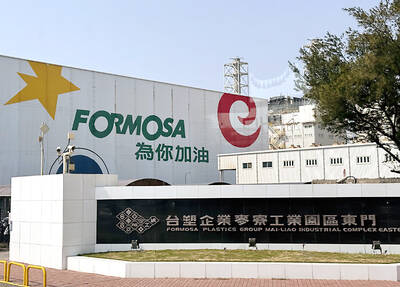Taiwanese PC makers and major component suppliers, including handset chip maker MediaTek Inc (聯發科) and panel maker AU Optronics Corp (友達光電), are expected to benefit from China’s latest $4 trillion yuan (US$570 billion) economic stimulus package primarily by boosting electronics spending in rural areas, a local research house said.
Taiwanese manufacturers will get a much-needed boost from this economic stimulus plan as orders plunged on shrinking demand in the US and Europe amid the global financial crisis, Taipei-based Topology Research Institute (拓墣產業研究所) said in a report released last week.
“With strong cost-saving ability, Taiwanese companies may grab more orders as their major PC customers such as Dell Inc and Hewlett Packard Co have joined the bid [to supply PCs in China’s remote areas],” Topology analyst Jeter Chang (張瑞華) said in the report.
Topology expects that local PC makers, including Quanta Computer Inc (廣達電腦) and Compal Electronics Inc (仁寶電腦), this year may increase their notebook computer shipments by 2.5 million units helped by demand from China’s rural areas, boosting revenues by NT$38 billion.
To spur economic growth, Beijing has pledged to boost sales of 10 electronics goods ranging from mobile phones and refrigerators to PCs and automobiles via subsidies equal to 13 percent of the purchase amount in rural areas, the report said.
Topology expects the spending stimulus plan to boost electronics spending by around NT$3.6 trillion during the four-year period starting this year.
In addition to PC companies, Taiwanese liquid-crystal-display (LCD) panel makers, including the nation’s two largest LCD suppliers, AU Optronics and Chi Mei Optoelectronics Corp (奇美電子), have secured NT$5.55 billion in orders from Chinese TV vendors this year, Topology’s report said.
Late last month, Chi Mei said new demand from China would help expand its revenues from China to around 25 percent or 35 percent of its total revenues from 15 percent or 20 percent last year, making China either the biggest or the second-biggest export destination for its products.
MediaTek, which is the top handset chip supplier in China, will be the biggest beneficiary of the drive to spur mobile phone purchases as it is supplying chips to 10 out of the 13 mobile phone makers that have won the bid to supply handsets, Topology said.
Sitronix Technology Corp (矽創) and Orise Technology Co Ltd (旭曜), which make drive ICs used in mobile phone screens, have also landed big orders this year by supplying 70 percent of panel drive ICs for the 1 million handset sales target in China’s remote areas, Topology’s report said.
In addition to the short-term boost in orders, China’s four-year plan to boost electronics spending in rural areas “also opens a door to Taiwanese brand-name electronics makers to build a foothold there,” Chang said.

EXTRATERRITORIAL REACH: China extended its legal jurisdiction to ban some dual-use goods of Chinese origin from being sold to the US, even by third countries Beijing has set out to extend its domestic laws across international borders with a ban on selling some goods to the US that applies to companies both inside and outside China. The new export control rules are China’s first attempt to replicate the extraterritorial reach of US and European sanctions by covering Chinese products or goods with Chinese parts in them. In an announcement this week, China declared it is banning the sale of dual-use items to the US military and also the export to the US of materials such as gallium and germanium. Companies and people overseas would be subject to

Taiwan Semiconductor Manufacturing Co (TSMC, 台積電) founder Morris Chang (張忠謀) yesterday said that Intel Corp would find itself in the same predicament as it did four years ago if its board does not come up with a core business strategy. Chang made the remarks in response to reporters’ questions about the ailing US chipmaker, once an archrival of TSMC, during a news conference in Taipei for the launch of the second volume of his autobiography. Intel unexpectedly announced the immediate retirement of former chief executive officer Pat Gelsinger last week, ending his nearly four-year tenure and ending his attempts to revive the

WORLD DOMINATION: TSMC’s lead over second-placed Samsung has grown as the latter faces increased Chinese competition and the end of clients’ product life cycles Taiwan Semiconductor Manufacturing Co (TSMC, 台積電) retained the No. 1 title in the global pure-play wafer foundry business in the third quarter of this year, seeing its market share growing to 64.9 percent to leave South Korea’s Samsung Electronics Co, the No. 2 supplier, further behind, Taipei-based TrendForce Corp (集邦科技) said in a report. TSMC posted US$23.53 billion in sales in the July-September period, up 13.0 percent from a quarter earlier, which boosted its market share to 64.9 percent, up from 62.3 percent in the second quarter, the report issued on Monday last week showed. TSMC benefited from the debut of flagship

TENSE TIMES: Formosa Plastics sees uncertainty surrounding the incoming Trump administration in the US, geopolitical tensions and China’s faltering economy Formosa Plastics Group (台塑集團), Taiwan’s largest industrial conglomerate, yesterday posted overall revenue of NT$118.61 billion (US$3.66 billion) for last month, marking a 7.2 percent rise from October, but a 2.5 percent fall from one year earlier. The group has mixed views about its business outlook for the current quarter and beyond, as uncertainty builds over the US power transition and geopolitical tensions. Formosa Plastics Corp (台灣塑膠), a vertically integrated supplier of plastic resins and petrochemicals, reported a monthly uptick of 15.3 percent in its revenue to NT$18.15 billion, as Typhoon Kong-rey postponed partial shipments slated for October and last month, it said. The